【机械类文献翻译】冲压成形的特点与板材冲压成形性能
中英文翻译---冲压成形的特点与板材冲压成形性能
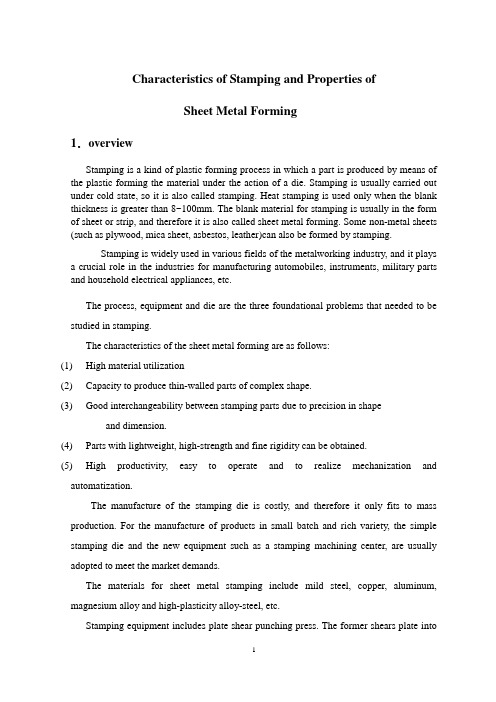
Characteristics of Stamping and Properties ofSheet Metal Forming1.overviewStamping is a kind of plastic forming process in which a part is produced by means of the plastic forming the material under the action of a die. Stamping is usually carried out under cold state, so it is also called stamping. Heat stamping is used only when the blank thickness is greater than 8~100mm. The blank material for stamping is usually in the form of sheet or strip, and therefore it is also called sheet metal forming. Some non-metal sheets (such as plywood, mica sheet, asbestos, leather)can also be formed by stamping.Stamping is widely used in various fields of the metalworking industry, and it plays a crucial role in the industries for manufacturing automobiles, instruments, military parts and household electrical appliances, etc.The process, equipment and die are the three foundational problems that needed to be studied in stamping.The characteristics of the sheet metal forming are as follows:(1)High material utilization(2)Capacity to produce thin-walled parts of complex shape.(3)Good interchangeability between stamping parts due to precision in shapeand dimension.(4)Parts with lightweight, high-strength and fine rigidity can be obtained.(5)High productivity, easy to operate and to realize mechanization and automatization.The manufacture of the stamping die is costly, and therefore it only fits to mass production. For the manufacture of products in small batch and rich variety, the simple stamping die and the new equipment such as a stamping machining center, are usually adopted to meet the market demands.The materials for sheet metal stamping include mild steel, copper, aluminum, magnesium alloy and high-plasticity alloy-steel, etc.Stamping equipment includes plate shear punching press. The former shears plate intostrips with a definite width, which would be pressed later. The later can be used both in shearing and forming.2.Characteristics of stamping formingThere are various processes of stamping forming with different working patterns and names. But these processes are similar to each other in plastic deformation. There are following conspicuous characteristics in stamping:(1).The force per unit area perpendicular to the blank surface is not large but is enough to cause the material plastic deformation. It is much less than the inner stresses on the plate plane directions. In most cases stamping forming can be treated approximately as that of the plane stress state to simplify vastly the theoretical analysis and the calculation of the process parameters.(2).Due to the small relative thickness, the anti-instability capability of the blank is weak under compressive stress. As a result, the stamping process is difficult to proceed successfully without using the anti-instability device (such as blank holder). Therefore the varieties of the stamping processes dominated by tensile stress are more than dominated by compressive stress.(3).During stamping forming, the inner stress of the blank is equal to or sometimes less than the yield stress of the material. In this point, the stamping is different from the bulk forming. During stamping forming, the influence of the hydrostatic pressure of the stress state in the deformation zone to the forming limit and the deformation resistance is not so important as to the bulk forming. In some circumstances, such influence may be neglected. Even in the case when this influence should be considered, the treating method is also different from that of bulk forming.(4).In stamping forming, the restrain action of the die to the blank is not severs as in the case of the bulk forming (such as die forging). In bulk forming, the constraint forming is proceeded by the die with exactly the same shape of the part. Whereas in stamping, in most cases, the blank has a certain degree of freedom, only one surface of the blank contacts with the die. In some extra cases, such as the forming of the blank on thedeforming zone contact with the die. The deformation in these regions are caused and controlled by the die applying an external force to its adjacent area.Due to the characteristics of stamping deformation and mechanics mentioned above, the stamping technique is different form the bulk metal forming:(1).The importance or the strength and rigidity of the die in stamping forming is less than that in bulk forming because the blank can be formed without applying large pressure per unit area on its surface. Instead, the techniques of the simple die and the pneumatic and hydraulic forming are developed.(2).Due to the plane stress or simple strain state in comparison with bulk forming, more research on deformation or force and power parameters has been done. Stamping forming can be performed by more reasonable scientific methods. Based on the real time measurement and analysis on the sheet metal properties and stamping parameters, by means of computer and some modern testing apparatus, research on the intellectualized control of stamping process is also in proceeding.(3).It is shown that there is a close relationship between stamping forming and raw material. The research on the properties of the stamping forming, that is, forming ability and shape stability, has become a key point in stamping technology development, but also enhances the manufacturing technique of iron and steel industry, and provides a reliable foundation for increasing sheet metal quality.3.Categories of stamping formingMany deformation processes can be done by stamping, the basic processes of the stamping can be divided into two kinds: cutting and forming.Cutting is a shearing process that one part of the blank is cut from the other. It mainly includes blanking, punching, trimming, parting and shaving, where punching and blanking are the most widely used. Forming is a process that one part of the blank has some displacement from the other. It mainly includes deep drawing, bending, local forming, bulging, flanging, necking, sizing and spinning.In substance, stamping forming is such that the plastic deformation occurs in thedeformation zone of the stamping blank caused by the external force. The stress state and deformation characteristic of the deformation zone are the basic factors to decide the properties of the stamping forming. Based on the stress state and deformation characteristics of the deformation zone, the forming methods can be divided into several categories with the same forming properties and be studied systematically.The deformation zone in almost all types of stamping forming is in the plane stress state. Usually there is no force or only small force applied on the blank surface. When is assumed that the stress perpendicular to the blank surface equals to zero, two principal stresses perpendicular to each other and act on the blank surface produce the plastic deformation of the material. Due to the small thickness of the blank, it is assumed approximately the two principal stresses distribute uniformly along the thickness direction. Based on this analysis, the stress state and the deformation characteristics of the deformation zone in all kinds of stamping forming can be denoted by the points in the coordinates of the plane principal stresses and the coordinates of the corresponding plane principal strains.4.Raw materials for stamping formingThere are a lot of raw materials used in stamping forming, and the properties of these materials may have large difference. The stamping forming can be succeeded only by determining the stamping method, the forming parameters and the die structures according to the properties and characteristics of the raw materials. The deformation of the blank during stamping forming has been investigated quite thoroughly. The relationships between the material properties decided by the chemistry component and structure of the material and the stamping forming has been established clearly. Not only the proper material can be selected based on the working condition and usage demand, but also the new material can be developed according to the demands of the blank properties during processing the stamping part. This is an important domain in stamping forming research. The research on the material properties for stamping forming is as follows:(1).Definition of the stamping property of the material.(2).Method to judge the stamping property of the material, find parameters to express the definitely material property of the stamping forming, establish the relationship between the property parameters and the practical stamping forming, and investigate the testing methods of the property parameters.(3).Establish the relationship among the chemical component, structure, manufacturing process and stamping property.The raw materials for stamping forming mainly include various metals and nonmetal plate. Sheet metal includes both ferrous and nonferrous metals. Although a lot of sheet metals are used in stamping forming, the most widely used materials are steel, stainless steel, aluminum alloy and various composite metal plates.5.Stamping forming property of sheet metal and its assessing method The stamping forming property of the sheet metal is the adaptation capability of the sheet metal to stamping forming. It has crucial meaning to the investigation of the stamping forming property of the sheet metal. In order to produce stamping forming parts with most scientific, economic and rational stamping forming process and forming parameters, it is necessary to understand clearly the properties of the sheet metal, so as to utilize the potential of the sheet metal fully in the production. On the other hand, to select plate material accurately and rationally in accordance with the characteristics of the shape and dimension of the stamping forming part and its forming technique is also necessary so that a scientific understanding and accurate judgment to the stamping forming properties of the sheet metal may be achieved.There are direct and indirect testing methods to assess the stamping property of the sheet metal.Practicality stamping test is the most direct method to assess stamping forming property of the sheet metal. This test is done exactly in the same condition as actual production by using the practical equipment and dies. Surely, this test result is most reliable. But this kind of assessing method is not comprehensively applicable, and cannot be shared as a commonly used standard between factories.The simulation test is a kind of assessing method that after simplifying and summing up actual stamping forming methods, as well as eliminating many trivial factors, the stamping properties of the sheet metal are assessed, based on simplified axial-symmetric forming method under the same deformation and stress states between the testing plate and the actual forming states. In order to guarantee the reliability and generality of simulation results, a lot of factors are regulated in detail, such as the shape and dimension of tools for test, blank dimension and testing conditions(stamping velocity, lubrication method and blank holding force, etc).Indirect testing method is also called basic testing method its characteristic is to connect analysis and research on fundamental property and principle of the sheet metal during plastic deformation, and with the plastic deformation parameters of the sheet metal in actual stamping forming, and then to establish the relationship between the indirect testing results(indirect testing value) and the actual stamping forming property (forming parameters). Because the shape and dimension of the specimen and the loading pattern of the indirect testing are different from the actual stamping forming, the deformation characteristics and stress states of the indirect test are different from those of the actual one. So, the results obtained form the indirect test are not the stamping forming parameters, but are the fundamental parameters that can be used to represent the stamping forming property of the sheet metal.冲压成形的特点与板材冲压成形性能1.概述冲压是通过模具使板材产生塑性变形而获得成品零件的一次成形工艺方法。
板料冲压成形性能及冲压材料

板料冲压成形性能及冲压材料板料的冲压成形性能板料对各种冲压成形加工的适应能力称为板料的冲压成形性能。
具体地说,就是指能否用简便地工艺方法,高效率地用坯料生产出优质冲压件。
冲压成形性能是个综合性的概念,它涉及到的因素很多,其中有两个主要方面:一方面是成形极限,希望尽可能减少成形工序;另一方面是要保证冲压件质量符合设计要求。
下面分别讨论。
(一)成形极限在冲压成形中,材料的最大变形极限称为成形极限。
对不同的成形工序,成形极限应采用不同的极限变形系数来表示。
例如弯曲工序的最小相对弯曲半径、拉深工序的极限拉深系数等等。
这些极限变形系数可以在各种冲压手册中查到,也可通过实验求得。
依据什么来确定极限变形系数呢?这要看影响成形过程正常进行的因素是哪些。
冲压成形时外力可以直接作用在毛坯的变形区(例如胀形),也可以通过非变形区,包括已变形区(例如拉深)和待变形区(例如缩口、扩口等),将变形力传给变形区。
因此,影响成形过程正常进行的因素,可能发生在变形区,也可能发生在非变形区。
归纳起来,大致有下述几种情况:1.属于变形区的问题伸长类变形一般是因为拉应力过大,材料过度变薄,局部失稳而产生断裂,如胀形、翻孔、扩口和弯曲外区等的拉裂。
压缩类变形一般是因为压应力过大,超过了板材的临界应力,使板材丧失稳定性而产生起皱,如缩口、无压边圈拉深等的起皱。
2.属于非变形区的问题传力区承载能力不够:非变形区作为传力区时,往往由于变形力超过了该传力区的承载能力而使变形过程无法继续进行。
也分为两种情况:1)拉裂或过度变薄;例如拉深是利用已变形区作为拉力的传力区,若变形力超过已变形区的抗拉能力,就会在该区内发生拉裂或局部严重变薄而使工件报废。
2)失稳或塑性镦粗:例如扩口和缩口工序是利用待变形区作为压力的传力区,若变形力超过了管坯的承载能力,待变形区就会因失稳而压屈,或者发生塑性镦粗变形。
非传力区在内应力作用下破坏:非变形区不是传力区时,由于变形过程中金属流动的不均匀性,也可能产生过大的内应力而使之破坏。
冲压成型工艺特点
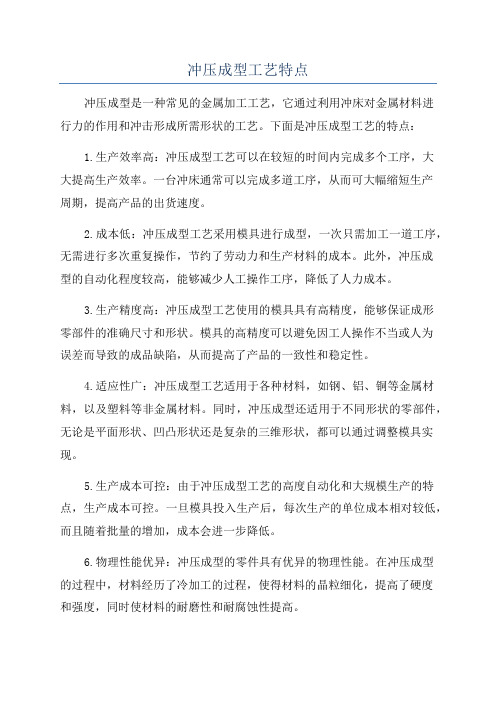
冲压成型工艺特点冲压成型是一种常见的金属加工工艺,它通过利用冲床对金属材料进行力的作用和冲击形成所需形状的工艺。
下面是冲压成型工艺的特点:1.生产效率高:冲压成型工艺可以在较短的时间内完成多个工序,大大提高生产效率。
一台冲床通常可以完成多道工序,从而可大幅缩短生产周期,提高产品的出货速度。
2.成本低:冲压成型工艺采用模具进行成型,一次只需加工一道工序,无需进行多次重复操作,节约了劳动力和生产材料的成本。
此外,冲压成型的自动化程度较高,能够减少人工操作工序,降低了人力成本。
3.生产精度高:冲压成型工艺使用的模具具有高精度,能够保证成形零部件的准确尺寸和形状。
模具的高精度可以避免因工人操作不当或人为误差而导致的成品缺陷,从而提高了产品的一致性和稳定性。
4.适应性广:冲压成型工艺适用于各种材料,如钢、铝、铜等金属材料,以及塑料等非金属材料。
同时,冲压成型还适用于不同形状的零部件,无论是平面形状、凹凸形状还是复杂的三维形状,都可以通过调整模具实现。
5.生产成本可控:由于冲压成型工艺的高度自动化和大规模生产的特点,生产成本可控。
一旦模具投入生产后,每次生产的单位成本相对较低,而且随着批量的增加,成本会进一步降低。
6.物理性能优异:冲压成型的零件具有优异的物理性能。
在冲压成型的过程中,材料经历了冷加工的过程,使得材料的晶粒细化,提高了硬度和强度,同时使材料的耐磨性和耐腐蚀性提高。
7.可实现多种复杂加工:冲压成型工艺可以实现多种复杂的加工,如切割、冲孔、贴合、打凸处理等。
通过调整模具和工艺参数,可以实现对材料进行多方向、多角度的加工,能够满足复杂零部件的加工要求。
8.环保节能:冲压成型工艺不需要使用大量的切削液和冷却液,减少了切削液和冷却液的消耗和处理成本。
此外,由于冲压成型工艺不会产生废气和废水,无需进行处理和排放,更加符合环保要求。
总之,冲压成型工艺具有高效、低成本、高精度、广泛适应性和优异的物理性能等特点,被广泛应用于各个行业的零部件制造过程中。
冲压成型工艺定义、特点及基本要求
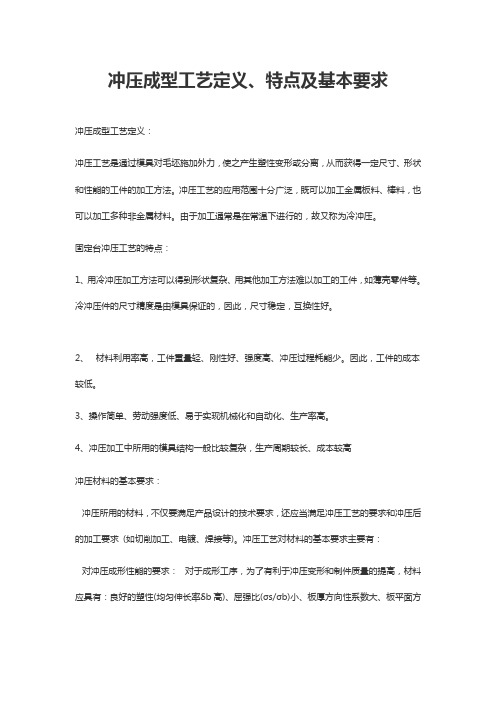
冲压成型工艺定义、特点及基本要求冲压成型工艺定义:冲压工艺是通过模具对毛坯施加外力,使之产生塑性变形或分离,从而获得一定尺寸、形状和性能的工件的加工方法。
冲压工艺的应用范围十分广泛,既可以加工金属板料、棒料,也可以加工多种非金属材料。
由于加工通常是在常温下进行的,故又称为冷冲压。
固定台冲压工艺的特点:1、用冷冲压加工方法可以得到形状复杂、用其他加工方法难以加工的工件,如薄壳零件等。
冷冲压件的尺寸精度是由模具保证的,因此,尺寸稳定,互换性好。
2、材料利用率高,工件重量轻、刚性好、强度高、冲压过程耗能少。
因此,工件的成本较低。
3、操作简单、劳动强度低、易于实现机械化和自动化、生产率高。
4、冲压加工中所用的模具结构一般比较复杂,生产周期较长、成本较高冲压材料的基本要求:冲压所用的材料,不仅要满足产品设计的技术要求,还应当满足冲压工艺的要求和冲压后的加工要求(如切削加工、电镀、焊接等)。
冲压工艺对材料的基本要求主要有:对冲压成形性能的要求:对于成形工序,为了有利于冲压变形和制件质量的提高,材料应具有:良好的塑性(均匀伸长率δb高)、屈强比(σs/σb)小、板厚方向性系数大、板平面方向性系数小、材料的屈服强度与弹性模量的比值(σs /E)小。
对于分离工序,并不需要材料有很好的塑性,但应具有一定的塑性。
塑性越好的材料,越不易分离。
对材料厚度公差的要求:材料的厚度公差应符合国家规定标准。
因为一定的模具间隙适用于一定厚度的材料,材料厚度公差太大,不仅直接影响制件的质量,还可能导致模具和冲床的损坏。
固定台冲床对表面质量的要求材料的表面应光洁平整,无分层和机械性质的损伤,无锈斑、氧化皮及其它附着物。
表面质量好的材料,冲压时不易破裂,不易擦伤模具,工件表面质量也好。
冲压工艺--板料的冲压成形性能与成形极限

t0
Dp
备注
0.5以下 10.~20 2ri≈0.2Dp 0.5~2.0 30~50 D0≥2.5Dp 2.0以上 50~100
3杯形件拉深试验(Swift试验)
Swift试验是以求极限拉深比LDR作为评定板材拉 深性能的试验方法。 试验所用装置与试验标准分别见图和表。
Swinft试验装置(1-冲头 2-压边圈 3-凹 模 4-试件)
六、板料的冲压成形性能与成形极限
板料基本性能与冲压成形性能的关系 衡量薄板性能的优劣,过去一般以薄板的基本 性能指标来评价,但是随着汽车、家电工业的发展, 对薄板成形性能的要求日益苛刻,从而使成形性指 标的测定越来越受到人们的重视和广泛研究。薄板 成形性(sheet metal formability),根据 BG/T15825.1-1995的定义,就是指金属薄板对 于冲压成形的适应能力。
具有最佳成形性能的材料应具有如下特点: 均匀分布应变; 承受平面内压缩应力而无起皱现象; 可以达到较高应变而无颈缩和断裂; 承受平面内剪切应力而无断裂; 零件由凹模出来后保持其形状 保持表面光洁,阻止表面损伤。
薄板本身固有的基本特性值与其成形性能之间具有一 定的相关性见下表。对于冷轧冲压钢板,往往希望具有 低的屈服强度、低的屈强比、高的n、r值。
坯料受到双向拉应力作用而实现胀形变形。 在胀形中当试件出现裂缝时,冲头的压入深度称为胀形深度或 Erichsen试验深度,简计为IE值。IE值作为评定板材胀形成 形能力的一个材料特性值。实际上,胀形是典型的拉伸类成形 工序,故IE值也是评定拉伸类冲压成形性能的一个材料特性值。 很明显,IE值越大,胀形性能越好。
2) 杯突试验(ERICHSEN TEST) 杯突试验是历史较为悠久、操作简便、在目前仍然广泛采用 的工艺试验方法,主要用来评定薄板材料的深冲性能,一般适 用于厚度等于或小于2mm,必要时也可试验厚度为2~4mm 的板材和带材,1914年是由德国的A.E.Erichsen做了专用的 试验设备,所以也叫Erichsen试验。其试验装置如图。 试验时,先将平板坯料试件放在凹模平面上,用压边圈压住试 件外圈,然后,用球形冲头将试件压入凹模。由于坯料外径比 凹模孔径大很多,所以,其外环不发生切向压缩变形,而与冲 头接触的试件中间部分。
冲压工艺--板料的冲压成形性能与成形极限

板料基本性能与冲压成形性能的关系 衡量薄板性能的优劣,过去一般以薄板的基本 性能指标来评价,但是随着汽车、家电工业的发展, 对薄板成形性能的要求日益苛刻,从而使成形性指 标的测定越来越受到人们的重视和广泛研究。薄板 成形性(sheet metal formability),根据 BG/T15825.1-1995的定义,就是指金属薄板对 于冲压成形的适应能力。
对数式,运用最小二乘法计算应变硬化指数n。(见下式)
20%)
产品标准规定或 协商
屈服后~最大力 前(常用15%)
12.5 (20)
50 (20,25)
75
≤11.5
12.5 (20)
50 (80)
75 (120)
3~30
≤0.5P
≤0.5P
屈服后~最大 力前(常用 10%~20%)
品标准规定或 协商
3~30
≤0.5P
屈服后~最大 力前(常用 5%~15%) 屈服后~最大 力前(常用
15%)
12.5 (20)
50 (80)
75 120
≤30
(12.5,20) 25
(50,80) 50
(60,120) 60
10~30
≤0.5P
≤0.8P
屈服后~最大 力前(常用 10%~20%)
屈服后~最大 力前(常用
σs /σb
σs /σb称为屈强比,它对板材冲压性能的影 响是多方面的。σs/σb的比例越低,屈服点和抗 拉强度的差距越大,钢板在同等强度对比加工 时,对压缩类成形工艺,材料起皱趋势也小; 对伸长类成形工艺,材料定形性和贴模性好, 回弹变形也小。
冲压成形性能试验方法与指标
1)机械性能的检验 拉伸试验是一种非常普遍的机械性能试验方
冲压工艺及模具设计经典教材-冲压工艺及模具设计-第2章冲压成形的特点
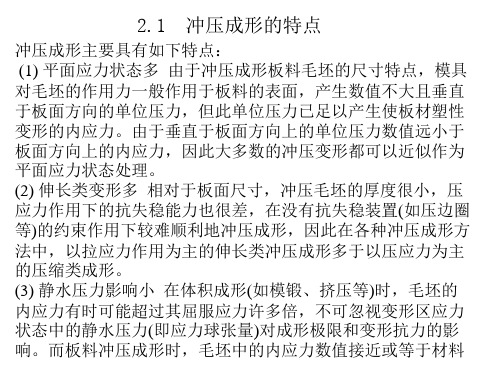
即在拉应力的方向上的应变是正的,是伸长变形。
由于r 0, ,当 r 时,r 0;单向压应力状态( r 0
)时,有 r / 2 0。 这种应力和变形状态处于冲压应力图中的EOF范围(见图2.2), 在冲压变形图中处于MOL范围(见图2.3)。
在冲压变形图中处于GOE范围(见图2.3)。
2. r 0 , t 0时的应力状态 当 r 0 , t 0时,由式(2.2)可知 2 r 0 ,所以一定要 0 。这表明,对于两向压应力作用的平面应力状态,如果 绝对值最大的应力是 ,0 则在这个方向上的应变一定是负的, 是压缩变形。
一般的简单拉伸完全一致。
上述两种冲压变形情况,两个应力的性质与比值范围以
及它们引起的变形都是一样的,仅仅是最大应力的方向不同。
因此,对于各向同性的均质材料,这两种变形是完全相同的。
2.3.2 两向压应力
冲压毛坯变形区受两向压应力的作用时,变形也可分两种情况
1.
r 当
r
0,0,tt
t 0 和 r 0 , t 0。
1. r 0, t 0 时的应力状态
当 r 0 , t 0 按全量理论可以写出如下应力与应变的关
系
r t k
r m m t m
(2.1)
式中:r , ,t ——分别是轴对称冲压成形时的经向、纬向
2.1 冲压成形的特点
冲压成形主要具有如下特点: (1) 平面应力状态多 由于冲压成形板料毛坯的尺寸特点,模具 对毛坯的作用力一般作用于板料的表面,产生数值不大且垂直 于板面方向的单位压力,但此单位压力已足以产生使板材塑性 变形的内应力。由于垂直于板面方向上的单位压力数值远小于 板面方向上的内应力,因此大多数的冲压变形都可以近似作为 平面应力状态处理。 (2) 伸长类变形多 相对于板面尺寸,冲压毛坯的厚度很小,压 应力作用下的抗失稳能力也很差,在没有抗失稳装置(如压边圈 等)的约束作用下较难顺利地冲压成形,因此在各种冲压成形方 法中,以拉应力作用为主的伸长类冲压成形多于以压应力为主 的压缩类成形。 (3) 静水压力影响小 在体积成形(如模锻、挤压等)时,毛坯的 内应力有时可能超过其屈服应力许多倍,不可忽视变形区应力 状态中的静水压力(即应力球张量)对成形极限和变形抗力的影 响。而板料冲压成形时,毛坯中的内应力数值接近或等于材料
冲压成形技术
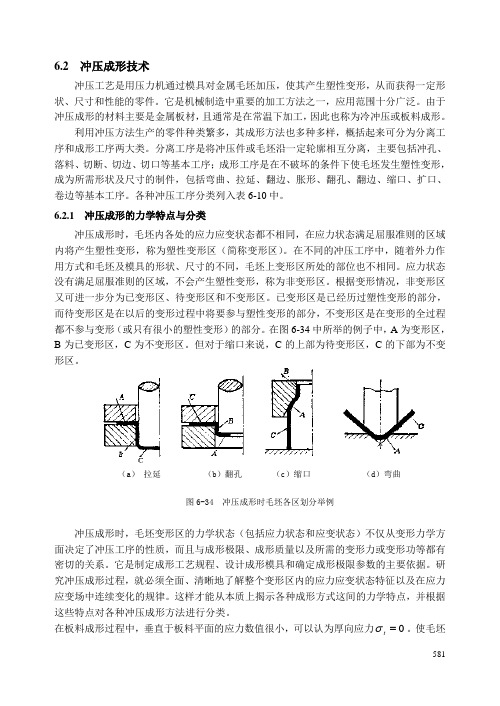
5816.2 冲压成形技术冲压工艺是用压力机通过模具对金属毛坯加压,使其产生塑性变形,从而获得一定形状、尺寸和性能的零件。
它是机械制造中重要的加工方法之一,应用范围十分广泛。
由于冲压成形的材料主要是金属板材,且通常是在常温下加工,因此也称为冷冲压或板料成形。
利用冲压方法生产的零件种类繁多,其成形方法也多种多样,概括起来可分为分离工序和成形工序两大类。
分离工序是将冲压件或毛坯沿一定轮廓相互分离,主要包括冲孔、落料、切断、切边、切口等基本工序;成形工序是在不破坏的条件下使毛坯发生塑性变形,成为所需形状及尺寸的制件,包括弯曲、拉延、翻边、胀形、翻孔、翻边、缩口、扩口、卷边等基本工序。
各种冲压工序分类列入表6-10中。
6.2.1 冲压成形的力学特点与分类冲压成形时,毛坯内各处的应力应变状态都不相同,在应力状态满足屈服准则的区域内将产生塑性变形,称为塑性变形区(简称变形区)。
在不同的冲压工序中,随着外力作用方式和毛坯及模具的形状、尺寸的不同,毛坯上变形区所处的部位也不相同。
应力状态没有满足屈服准则的区域,不会产生塑性变形,称为非变形区。
根据变形情况,非变形区又可进一步分为已变形区、待变形区和不变形区。
已变形区是已经历过塑性变形的部分,而待变形区是在以后的变形过程中将要参与塑性变形的部分,不变形区是在变形的全过程都不参与变形(或只有很小的塑性变形)的部分。
在图6-34中所举的例子中,A 为变形区,B 为已变形区,C 为不变形区。
但对于缩口来说,C 的上部为待变形区,C 的下部为不变形区。
图6-34 冲压成形时毛坯各区划分举例冲压成形时,毛坯变形区的力学状态(包括应力状态和应变状态)不仅从变形力学方面决定了冲压工序的性质,而且与成形极限、成形质量以及所需的变形力或变形功等都有密切的关系。
它是制定成形工艺规程、设计成形模具和确定成形极限参数的主要依据。
研究冲压成形过程,就必须全面、清晰地了解整个变形区内的应力应变状态特征以及在应力应变场中连续变化的规律。
第六章板料冲压成形性能

• 定形性指零件脱模后保持其在模内既得形 状的能力。影响定形性的诸因素中,回弹 是最主要的因素,零件脱模后,常因回弹 过大而产生较大的形状误差。 • 板料的贴模和定形性好坏与否,是决定零 件形状尺寸精确度的重要因素。 • 1980年,日本学者吉田清太提出,用方板 对角拉伸(图6-53)时的起皱特性可以估 测和研究板料的贴模性和定形性,但在目 前的冲压生产和板料生产中,仍主要用抗 破裂性作为评定板料冲压成形性能的指标。
第六章 板料的冲压成形性能与成形 极限
• 板料对冲压成形工艺的适应能力叫做板料 的冲压成形性能。板料在成形过程中可能 出现两种失稳现象:一种叫拉伸失稳;表 现为板料在拉应力作用下局部出现缩颈或 破裂;另外一种叫压缩失稳,表现为板料 在压应力作用下出现皱纹。板料发生失稳 前可以达到的最大变形程度叫做成形极限。
• 2.扩孔成形性能试验 • 3.拉深成形性能试验 测定或评价板料拉深成 形性能时,常采用圆柱形平 底凸模冲杯试验(Swift平底 冲杯试验)或TZP试验(拉 深潜力试验。冲杯试验是一 种传统试验方法,但试验比 较繁杂。TZP试验方法比较 简便,但需要专用试验装置 或设备。冲杯试验和TZP试 验均可反映拉深成形性能, 但二者试验原理不同,不能 等价替代。(本课程安排冲 杯实验) 4.弯曲成形性能试验
• 一般来讲,冲压成形性能是介于材料科学 和冲压成形技术之间的一个边缘问题。冲 压成形性能除与板料的材质、组织结构和 性能有关外,冲压技术的改善也常常会使 成形性能得到提高。
二、冲压成形区域与成形性能的划分
• 生产中常将圆柱形凸模胀形、伸长类翻边(包括扩孔)、 拉伸以及弯曲视为四种最典型、最常用的冲压成形方式 (图6-1),而一些比较复杂的冲压成形方式经常可视为 它们之中的两个或两个以上的复合。例如,汽车覆盖件等 一些形状比较复杂的的零件成形,常常表现为“拉压-胀 形”复合方式(图6-2)。
冲床挤压成形对材料性能的影响与研究
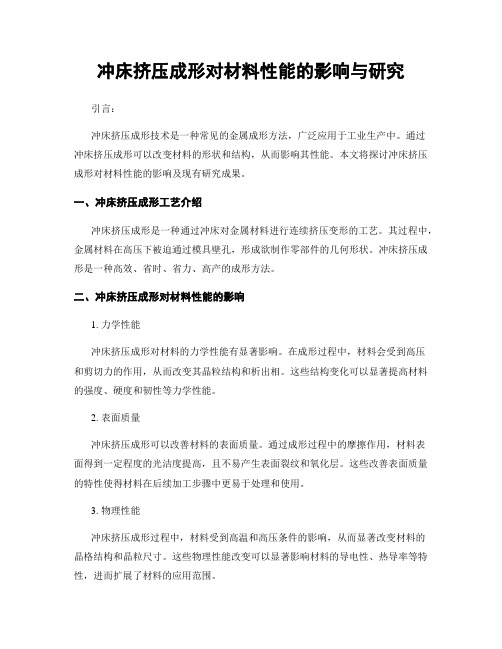
冲床挤压成形对材料性能的影响与研究引言:冲床挤压成形技术是一种常见的金属成形方法,广泛应用于工业生产中。
通过冲床挤压成形可以改变材料的形状和结构,从而影响其性能。
本文将探讨冲床挤压成形对材料性能的影响及现有研究成果。
一、冲床挤压成形工艺介绍冲床挤压成形是一种通过冲床对金属材料进行连续挤压变形的工艺。
其过程中,金属材料在高压下被迫通过模具壁孔,形成欲制作零部件的几何形状。
冲床挤压成形是一种高效、省时、省力、高产的成形方法。
二、冲床挤压成形对材料性能的影响1. 力学性能冲床挤压成形对材料的力学性能有显著影响。
在成形过程中,材料会受到高压和剪切力的作用,从而改变其晶粒结构和析出相。
这些结构变化可以显著提高材料的强度、硬度和韧性等力学性能。
2. 表面质量冲床挤压成形可以改善材料的表面质量。
通过成形过程中的摩擦作用,材料表面得到一定程度的光洁度提高,且不易产生表面裂纹和氧化层。
这些改善表面质量的特性使得材料在后续加工步骤中更易于处理和使用。
3. 物理性能冲床挤压成形过程中,材料受到高温和高压条件的影响,从而显著改变材料的晶格结构和晶粒尺寸。
这些物理性能改变可以显著影响材料的导电性、热导率等特性,进而扩展了材料的应用范围。
三、现有研究成果1. 实验研究已有研究通过实验评估和分析冲床挤压成形对不同材料的影响。
研究结果表明,冲床挤压成形可以显著提高材料的硬度和强度,有利于降低材料的缺陷程度。
同时,通过实验还发现了冲床挤压成形对材料微观结构的影响,如晶粒尺寸、晶界角度和析出相等。
2. 模拟仿真研究一些研究采用数值模拟方法对冲床挤压成形过程进行建模和仿真。
通过模拟分析,可以预测冲床挤压成形对材料力学性能和物理性能的影响,为工程设计和工艺改进提供参考。
3. 材料选型优化研究冲床挤压成形的应用范围广泛,适用于多种金属材料的成形。
因此,围绕不同材料的特性和应用要求,已有研究对于冲床挤压成形时材料的选型进行了优化研究。
这些研究结果可以指导工程实践中合理选择材料,以满足产品性能和质量要求。
冲压板材的成形性

冲压板材的成形性
崔令江
【期刊名称】《锻压机械》
【年(卷),期】1997(032)003
【摘要】介绍了冲压板材的成形性直接影响到冲压件的质量,技术性能的评价指
标也庆随着对冲压件的质量要求的提高进行更新和进步。
为了与要求冲压件不破裂,形状精度高和尺寸精度高相适应,从抗破裂性能,抗起皱性能和抗弹复性能三方面衡量板材的冲压性能,比只考虑抗破裂性能更合理,更科学,更具有实用性。
【总页数】3页(P23-24,25)
【作者】崔令江
【作者单位】中国重型汽车公司公司
【正文语种】中文
【中图分类】TG386.41
【相关文献】
1.超高强度钢BG590CL板材冲压成形性能的试验研究 [J], 张红梅
2.几种不锈钢板材冲压成形性能的试验研究 [J], 杨钒;杨瑞霞
3.影响金属板材的冲压成形性能材料因素浅析 [J], 袁晓涛
4.基于伺服技术的板材冲压成形性研究 [J], 杜长胜;朱梅云;
5.板材成形性能研究及覆盖件用冷冲压板材选择 [J], 王东哲;何丹农;张永清
因版权原因,仅展示原文概要,查看原文内容请购买。
冲压成形性能

一般应力状态:ζ 1-ζ 3=β ζ
第三章 冲压成形原理与成形极限
三、塑性力学基础(续)
3.金属塑性变形时的应力应变关系 弹性变形阶段:应力与应变之间的关系是线性的、可逆的, 与加载历史无关; 塑性变形阶段:应力与应变之间的关系则是非线性的、 不可逆的,与加载历史有关。
1 2 2 3 3 1 1 2 2 3 3 1
第三章 冲压成形原理与成形极限
四、金属塑性变形的一些基本规律
1.硬化规律 加工硬化: 塑性降低,变形抗力提高。能提高变形均匀性。 硬化曲线: 实际应力曲线或真实应力曲线。表示硬化规律。 这种变化规律可近似用指数曲线表示。 ζ =Aε
n
第三章 冲压成形原理与成形极限
四、金属塑性变形的一些基本规律(续)
4.最小阻力定律 在塑性变形中,破坏了金属的整体平衡而强制金属流动,当金 属质点有向几个方向移动的可能时,它向阻力最小的方向移动。 在冲压加工中,板料在变形过程中总是沿着阻力最小的方向发 展。这就是塑性变形中的最小阻力定律。 弱区先变形,变形区为弱区
第三章 冲压成形原理与成形极限
四、金属塑性变形的一些基本规律(续)
4.最小阻力定律(续) 控制变形的趋向性: 开流 和 限流
措施: (1)材料本身的特性
(2)板料的应力状态 冲压工序的性质 工艺参数 模具结构参数(如凸模、凹模工作 部分的圆角半径,摩擦和间隙等。
第三章 冲压成形原理与成形极限
五、冲压材料及其冲压成形性能
1.冲压成形性能 材料的冲压成形性能:材料对各种冲压加工方法的适应能力。 冲压加工的依据。
第一章 冲压模具设计与制造基础
三、塑性力学基础
1.点的应力与应变状态 为了全面、完整地描述变形区内各点的受力和变形情况 。 应力——正应力、剪应力 应力状态: 通常是围绕该点取出一个微小(正)六面体(即所谓 单元体),用该单元体上三个相互垂直面上的九个应力分量来 表示。已知该九个应力分量,则过此点任意切面上的应力都可 求得。 主应力状态 塑性变形可能出现九种主应力状态。
板料成形
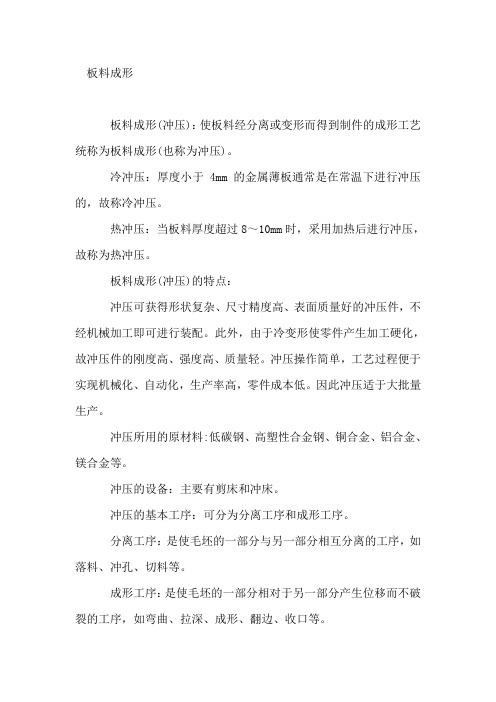
板料成形板料成形(冲压):使板料经分离或变形而得到制件的成形工艺统称为板料成形(也称为冲压)。
冷冲压:厚度小于4mm的金属薄板通常是在常温下进行冲压的,故称冷冲压。
热冲压:当板料厚度超过8~10mm时,采用加热后进行冲压,故称为热冲压。
板料成形(冲压)的特点:冲压可获得形状复杂、尺寸精度高、表面质量好的冲压件,不经机械加工即可进行装配。
此外,由于冷变形使零件产生加工硬化,故冲压件的刚度高、强度高、质量轻。
冲压操作简单,工艺过程便于实现机械化、自动化,生产率高,零件成本低。
因此冲压适于大批量生产。
冲压所用的原材料:低碳钢、高塑性合金钢、铜合金、铝合金、镁合金等。
冲压的设备:主要有剪床和冲床。
冲压的基本工序:可分为分离工序和成形工序。
分离工序:是使毛坯的一部分与另一部分相互分离的工序,如落料、冲孔、切料等。
成形工序:是使毛坯的一部分相对于另一部分产生位移而不破裂的工序,如弯曲、拉深、成形、翻边、收口等。
1.冲裁:使坯料按封闭轮廓分离的工序称为冲裁,它主要包括落料、冲孔、切边、切口、剖切、整修等。
落料:是利用冲裁取得一定外形的制件或毛坯的冲压方法,冲落部分为成品,周边为废料。
冲孔:是将冲压坯内的材料以封闭的轮廓分离开来,得到带孔制件的一种冲压方法,冲落部分为废料,周边为成品冲裁的分离过程:1)弹性变形阶段2)塑性变形阶段3)剪裂阶段2.弯曲:将板料、型材或管材在弯矩作用下弯成具有一定曲率和角度制件的工序称为弯曲。
1)弯曲变形过程2)弯裂及最小弯曲半径弯曲时,变形只发生在圆角范围内,其内侧受压缩,外侧受拉伸。
当外侧的拉力超过板料的抗拉强度时,即会造成外层金属破裂。
板料越厚,内弯曲半径r越小,压缩及拉伸应力就越大,也越易破裂。
为防止弯裂,必须规定出最小弯曲半径rmin,通常 rmin=(0.25~1)t,t为板厚。
影响最小弯曲半径的主要因素如下:①材料的力学性能②材料的热处理状态③弯曲件角度α④板料的纤维方向和表面质量3)弯曲时的回弹回弹:在材料弯曲变形结束,工件不受外力作用时,由于弹性恢复,使弯曲件的角度和弯曲半径与模具的尺寸和形状不一致,这种现象称为回弹。
- 1、下载文档前请自行甄别文档内容的完整性,平台不提供额外的编辑、内容补充、找答案等附加服务。
- 2、"仅部分预览"的文档,不可在线预览部分如存在完整性等问题,可反馈申请退款(可完整预览的文档不适用该条件!)。
- 3、如文档侵犯您的权益,请联系客服反馈,我们会尽快为您处理(人工客服工作时间:9:00-18:30)。
Characteristics of Stamping and Properties ofSheet Metal Forming1.overviewStamping is a kind of plastic forming process in which a part is produced by means of the plastic forming the material under the action of a die. Stamping is usually carried out under cold state, so it is also called stamping. Heat stamping is used only when the blank thickness is greater than 8~100mm. The blank material for stamping is usually in the form of sheet or strip, and therefore it is also called sheet metal forming. Some non-metal sheets (such as plywood, mica sheet, asbestos, leather)can also be formed by stamping.Stamping is widely used in various fields of the metalworking industry, and it plays a crucial role in the industries for manufacturing automobiles, instruments, military parts and household electrical appliances, etc.The process, equipment and die are the three foundational problems that needed to be studied in stamping.The characteristics of the sheet metal forming are as follows:(1)High material utilization(2)Capacity to produce thin-walled parts of complex shape.(3)Good interchangeability between stamping parts due to precision in shapeand dimension.(4)Parts with lightweight, high-strength and fine rigidity can be obtained.(5)High productivity, easy to operate and to realize mechanization and automatization.The manufacture of the stamping die is costly, and therefore it only fits to mass production. For the manufacture of products in small batch and rich variety, the simple stamping die and the new equipment such as a stamping machining center, are usually adopted to meet the market demands.The materials for sheet metal stamping include mild steel, copper, aluminum, magnesium alloy and high-plasticity alloy-steel, etc.Stamping equipment includes plate shear punching press. The former shears plate intostrips with a definite width, which would be pressed later. The later can be used both in shearing and forming.2.Characteristics of stamping formingThere are various processes of stamping forming with different working patterns and names. But these processes are similar to each other in plastic deformation. There are following conspicuous characteristics in stamping:(1).The force per unit area perpendicular to the blank surface is not large but is enough to cause the material plastic deformation. It is much less than the inner stresses on the plate plane directions. In most cases stamping forming can be treated approximately as that of the plane stress state to simplify vastly the theoretical analysis and the calculation of the process parameters.(2).Due to the small relative thickness, the anti-instability capability of the blank is weak under compressive stress. As a result, the stamping process is difficult to proceed successfully without using the anti-instability device (such as blank holder). Therefore the varieties of the stamping processes dominated by tensile stress are more than dominated by compressive stress.(3).During stamping forming, the inner stress of the blank is equal to or sometimes less than the yield stress of the material. In this point, the stamping is different from the bulk forming. During stamping forming, the influence of the hydrostatic pressure of the stress state in the deformation zone to the forming limit and the deformation resistance is not so important as to the bulk forming. In some circumstances, such influence may be neglected. Even in the case when this influence should be considered, the treating method is also different from that of bulk forming.(4).In stamping forming, the restrain action of the die to the blank is not severs as in the case of the bulk forming (such as die forging). In bulk forming, the constraint forming is proceeded by the die with exactly the same shape of the part. Whereas in stamping, in most cases, the blank has a certain degree of freedom, only one surface of the blank contacts with the die. In some extra cases, such as the forming of the blank on thedeforming zone contact with the die. The deformation in these regions are caused and controlled by the die applying an external force to its adjacent area.Due to the characteristics of stamping deformation and mechanics mentioned above, the stamping technique is different form the bulk metal forming:(1).The importance or the strength and rigidity of the die in stamping forming is less than that in bulk forming because the blank can be formed without applying large pressure per unit area on its surface. Instead, the techniques of the simple die and the pneumatic and hydraulic forming are developed.(2).Due to the plane stress or simple strain state in comparison with bulk forming, more research on deformation or force and power parameters has been done. Stamping forming can be performed by more reasonable scientific methods. Based on the real time measurement and analysis on the sheet metal properties and stamping parameters, by means of computer and some modern testing apparatus, research on the intellectualized control of stamping process is also in proceeding.(3).It is shown that there is a close relationship between stamping forming and raw material. The research on the properties of the stamping forming, that is, forming ability and shape stability, has become a key point in stamping technology development, but also enhances the manufacturing technique of iron and steel industry, and provides a reliable foundation for increasing sheet metal quality.3.Categories of stamping formingMany deformation processes can be done by stamping, the basic processes of the stamping can be divided into two kinds: cutting and forming.Cutting is a shearing process that one part of the blank is cut from the other. It mainly includes blanking, punching, trimming, parting and shaving, where punching and blanking are the most widely used. Forming is a process that one part of the blank has some displacement from the other. It mainly includes deep drawing, bending, local forming, bulging, flanging, necking, sizing and spinning.In substance, stamping forming is such that the plastic deformation occurs in thedeformation zone of the stamping blank caused by the external force. The stress state and deformation characteristic of the deformation zone are the basic factors to decide the properties of the stamping forming. Based on the stress state and deformation characteristics of the deformation zone, the forming methods can be divided into several categories with the same forming properties and be studied systematically.The deformation zone in almost all types of stamping forming is in the plane stress state. Usually there is no force or only small force applied on the blank surface. When is assumed that the stress perpendicular to the blank surface equals to zero, two principal stresses perpendicular to each other and act on the blank surface produce the plastic deformation of the material. Due to the small thickness of the blank, it is assumed approximately the two principal stresses distribute uniformly along the thickness direction. Based on this analysis, the stress state and the deformation characteristics of the deformation zone in all kinds of stamping forming can be denoted by the points in the coordinates of the plane principal stresses and the coordinates of the corresponding plane principal strains.4.Raw materials for stamping formingThere are a lot of raw materials used in stamping forming, and the properties of these materials may have large difference. The stamping forming can be succeeded only by determining the stamping method, the forming parameters and the die structures according to the properties and characteristics of the raw materials. The deformation of the blank during stamping forming has been investigated quite thoroughly. The relationships between the material properties decided by the chemistry component and structure of the material and the stamping forming has been established clearly. Not only the proper material can be selected based on the working condition and usage demand, but also the new material can be developed according to the demands of the blank properties during processing the stamping part. This is an important domain in stamping forming research. The research on the material properties for stamping forming is as follows:(1).Definition of the stamping property of the material.(2).Method to judge the stamping property of the material, find parameters to express the definitely material property of the stamping forming, establish the relationship between the property parameters and the practical stamping forming, and investigate the testing methods of the property parameters.(3).Establish the relationship among the chemical component, structure, manufacturing process and stamping property.The raw materials for stamping forming mainly include various metals and nonmetal plate. Sheet metal includes both ferrous and nonferrous metals. Although a lot of sheet metals are used in stamping forming, the most widely used materials are steel, stainless steel, aluminum alloy and various composite metal plates.5.Stamping forming property of sheet metal and its assessing method The stamping forming property of the sheet metal is the adaptation capability of the sheet metal to stamping forming. It has crucial meaning to the investigation of the stamping forming property of the sheet metal. In order to produce stamping forming parts with most scientific, economic and rational stamping forming process and forming parameters, it is necessary to understand clearly the properties of the sheet metal, so as to utilize the potential of the sheet metal fully in the production. On the other hand, to select plate material accurately and rationally in accordance with the characteristics of the shape and dimension of the stamping forming part and its forming technique is also necessary so that a scientific understanding and accurate judgment to the stamping forming properties of the sheet metal may be achieved.There are direct and indirect testing methods to assess the stamping property of the sheet metal.Practicality stamping test is the most direct method to assess stamping forming property of the sheet metal. This test is done exactly in the same condition as actual production by using the practical equipment and dies. Surely, this test result is most reliable. But this kind of assessing method is not comprehensively applicable, and cannot be shared as a commonly used standard between factories.The simulation test is a kind of assessing method that after simplifying and summing up actual stamping forming methods, as well as eliminating many trivial factors, the stamping properties of the sheet metal are assessed, based on simplified axial-symmetric forming method under the same deformation and stress states between the testing plate and the actual forming states. In order to guarantee the reliability and generality of simulation results, a lot of factors are regulated in detail, such as the shape and dimension of tools for test, blank dimension and testing conditions(stamping velocity, lubrication method and blank holding force, etc).Indirect testing method is also called basic testing method its characteristic is to connect analysis and research on fundamental property and principle of the sheet metal during plastic deformation, and with the plastic deformation parameters of the sheet metal in actual stamping forming, and then to establish the relationship between the indirect testing results(indirect testing value) and the actual stamping forming property (forming parameters). Because the shape and dimension of the specimen and the loading pattern of the indirect testing are different from the actual stamping forming, the deformation characteristics and stress states of the indirect test are different from those of the actual one. So, the results obtained form the indirect test are not the stamping forming parameters, but are the fundamental parameters that can be used to represent the stamping forming property of the sheet metal.冲压成形的特点与板材冲压成形性能1.概述冲压是通过模具使板材产生塑性变形而获得成品零件的一次成形工艺方法。
